October is National Cyber Security Month, experts say change your passwords and more
SAVANNAH, Ga. (WSAV) – October is National Cyber Security Awareness Month and if you think you could never be a target, you are probably wrong. The hackers are out in droves.
“This has now become an industry, it’s no longer just a bunch of people sitting in a basement somewhere and hacking in from some third-world country,” said Ed Peters, a cyber security expert, and chief innovation officer at Panzura.
“This now a full supply chain based industry with access brokers who will see lists of accounts they found access to and got passwords for that others can buy on the dark web,” he said.
While many of us have heard of the recent hacks of large institutions, including hospitals, where ransom demands are made, Peters says crooks still go after average people.
“Actually, they find that individuals are probably less sophisticated in this and therefore easier to attack,” said Peters. “These attacks are going on at all levels right now, and 75 percent of the scams occur through email, and they tell you that there’s something wrong with one of your accounts or there’s a business transaction issue and get you to click on an attachment.”
If you click on that strange attachment, it can help a hacker infiltrate your computer and capture passwords to things like your bank account.
Peters estimates “less than 10 percent” of consumers are prepared for cyber threats.
He says we use technology for convenience and sometimes don’t want the inconvenience of doing things like changing passwords or figuring out to use a password manager system (which he recommends) or making sure we don’t use the same passwords for a number of accounts.
“Install hard passwords, rather than just using something you can easily remember, and don’t use the same passwords for multiple accounts,” Peters said. “The hackers call that ‘credential stuffing’ and once they find one password, they’ll try that on a number of your account and see which one works.”
If hackers do get a password that you use for several accounts, they may get your money, too. Peters reminds all of us…

